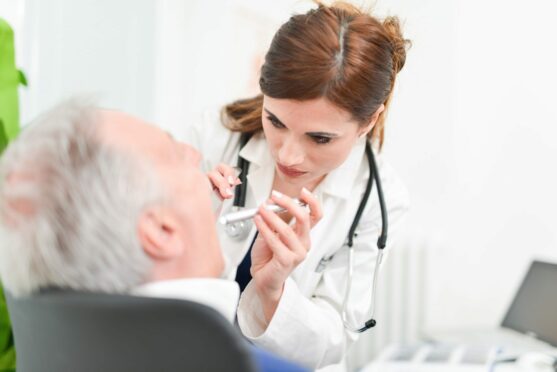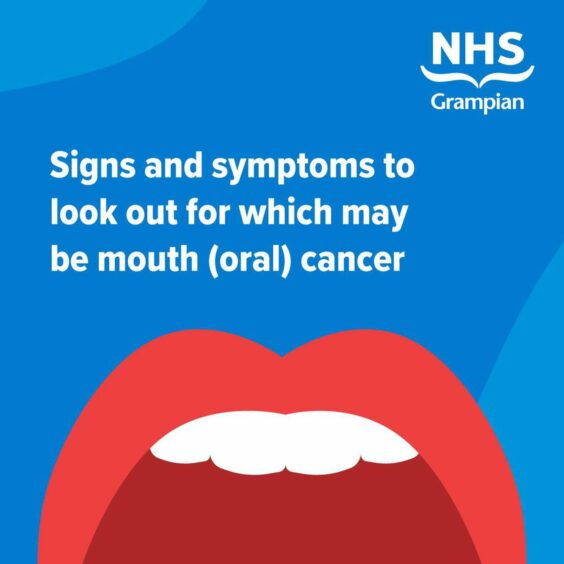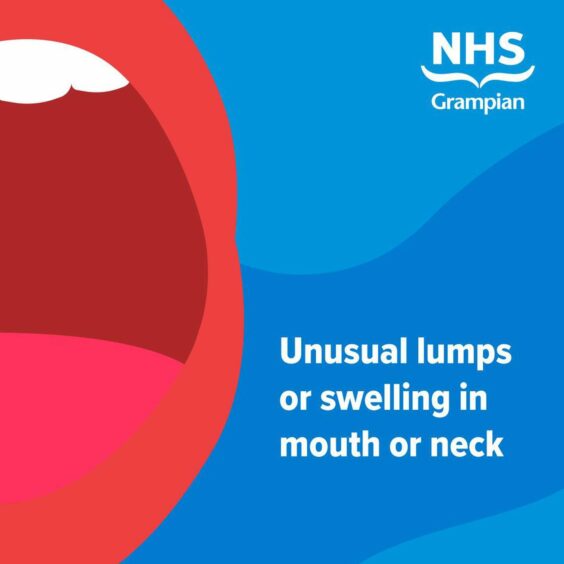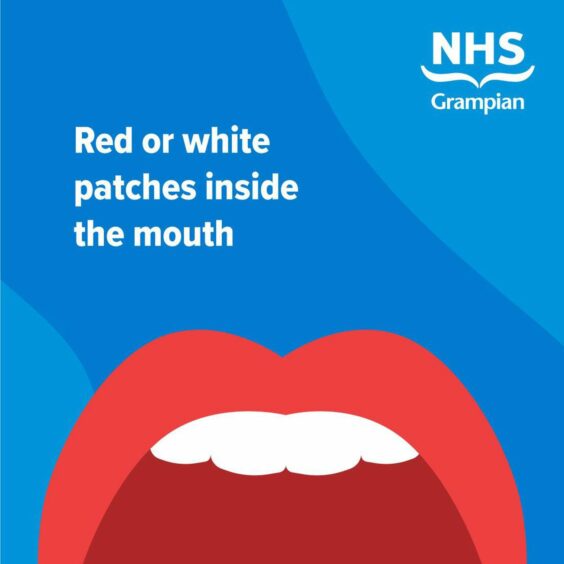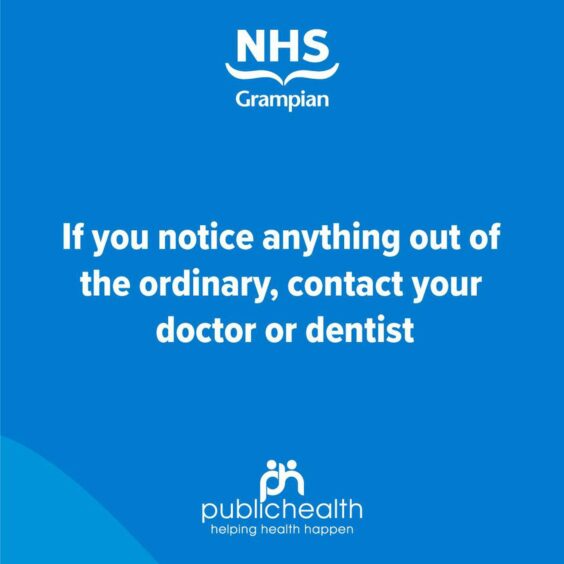November is mouth cancer awareness month and the issue has never needed more urgently addressed.
-
Some Press and Journal online content is funded by outside parties. The revenue from this helps to sustain our independent news gathering. You will always know if you are reading paid-for material as it will be clearly labelled as “Partnership” on the site and on social media channels.
This can take two different forms.
“Presented by”
This means the content has been paid for and produced by the named advertiser.
“In partnership with”
This means the content has been paid for and approved by the named advertiser but written and edited by our own commercial content team.
Cases of oral cancer have doubled over the past 30 years, with Scotland particularly badly affected.
Mr Terry Lowe, a consultant maxillofacial head and neck surgeon at NHS Grampian, reveals: “Rates are significantly higher in Scotland than in the rest of the UK. Each year around 8,300 get it across the UK and 600 in Scotland. The rates for both males and females are almost double those in England and the greatest burden remains in the most deprived areas.”
Another worrying trend is the fact that the disease is increasingly being seen in younger age groups. Although 85% of patients are over 50 years of age, recent reports show increasing numbers presenting 10-plus years below this. It’s particularly the case with oropharyngeal cancer where it affects the throat and neck.
So what can be done?
Well, the good news is the quicker you spot it, the better your chances are. When the disease is caught in its early stages the cure rate is around 90%. Leave it to stage four and the chances of survival drop to 18%.
NHS Grampian are urging people to check regularly for the disease. They also want the public to learn about the risk factors and symptoms of mouth cancer. After all, spotting it early really could be the difference between life and death.
What causes oral cancer?
Lifestyle plays a huge part in causing oral cancer. Smoking and drinking are still by far the biggest risk factors for the disease.
Mr Lowe says: “When combined smoking and drinking make it 44 times more likely for anyone at any age to get mouth cancer compared with non-drinkers and non-smokers.”
Poor diet with low levels of fruit and veg can also raise the chances of developing the disease, as can poor dental hygiene.
But one of the fastest growing causes of oral cancer is human papilloma virus (HPV). HPV is a group of viruses that are often symptomless and go unnoticed but can cause warts.
Mr Lowe says: “HPV is emerging as a major risk factor, particularly for oropharyngeal cancer.”
What does oral cancer look like?
There are many different symptoms of oral cancer. These include:
- Lumps around the head and neck
- Unexplained swelling around the head and neck
- Ulceration around the mouth
- Unexplained red or red and white patches around the mouth for six weeks.
- Painful swallowing, unexplained throat pain lasting three or four weeks.
How do I check for oral cancer?
The checking process is easy and the video above will show you how you can self-examine.
Firstly, feel around the face and behind the ears as well as the neck to check for lumps or swelling. After that look in the mirror and examine your lips and the skin inside your cheeks. Then examine your tongue. Stick out your tongue then put the tip of your tongue across to one cheek, and then across to the other cheek to see the top and both sides of your tongue. Next put the tip of your tongue to the top of the mouth to examine the underside of the tongue and the floor of your mouth. If you spot any ulcers, lumps or red and white patches then it’s best to get them checked out.
There are many specialists who are trained to spot signs of the disease. Dentists in particular can screen for it. It is recommended that you visit a dentist at least once a year for a mouth and neck examination. This is important even if you do not have your own natural teeth.
The main message is be aware of the symptoms and don’t be afraid to get checked out.
Mr Lowe says: “Visit your dentist regularly for a professional oral examination. Learn about self-examination. If there are any doubts, I would rather see patients who don’t have cancers but think they may have. That way we can pick up early stage disease and give patients better outcomes, higher survival rates and better quality of life.”
A survivor’s story
Richard, not his real name, who is in his 40s and from the Grampian area, was diagnosed with mouth cancer in 2009. But after surgery and with strong support he came through it and has been cancer free for years. Here he tells his story.
“On the stairs is a good place to reflect. It’s a good place to write a letter, and that’s where I found myself in 2009, writing a letter to my two-year-old son, for when he was older, explaining what had happened to me and why I was no longer around.
“It’s not easy to get a tone that will travel well down the years. I wasn’t happy with the words it’s just the way it is to explain the reasons why his father died before he was properly old enough to know him.
“Luckily that wasn’t the end of the story, though, and now I have the option to edit that letter, or delete it, or do as I’ve done and keep it in a box in the loft.
“My cancer story started one bright morning. The unusually strong sun through the window highlighted a lesion on my tongue, just a groove that wasn’t there before, like a depression in the middle of a lozenge.
“Things had been busy at work, so the fatigue I was feeling was easily put down to over-working.
“I went to visit my GP. There was a whitish, powdery look to the lesion on my tongue. I got a treatment which didn’t seem to improve things. It was only when I went to my dentist, thinking that this lesion might’ve been caused by a sharp edge of tooth, that he referred me to the maxillofacial unit.
“Before my maxillofacial appointment (at which a biopsy would be taken from my tongue) we’d booked a cottage on Mull with some good friends. I can remember playing tennis and afterwards even walking being an effort. I remember watching the eagles circling Ben More’s thermals and feeling a tiredness that was new and peculiar.
“The biopsy showed some of my cells were abnormal. They were cancerous. The options were outlined but the only option really was to operate. A quick decision had to be made and in less than ten days I underwent surgery.
“It’s human nature to postulate how long one might live for after getting such news and also to wonder about certain of your lifestyle choices. I can remember enquiring about a plot at a cemetery, not something I had expected to think about in my early forties.
“But my consultant Mr Lowe (and I believe this was part of the healing process) brimmed with optimism. After explaining all possible scenarios, he made it clear which of them he was choosing. ‘We’re going to get this,’ I remember him saying. His confidence fortified mine and, along with his skill as a surgeon, it realised my recovery. Every single person in the maxillofacial team, including reception staff, were instrumental in that – indefatigable, selfless and reassuring.
“My surgeon sampled a prominent lymph node in my neck to determine if the cancer had spread elsewhere (it hadn’t). The main operation was to take a large part of my tongue and replace it with muscle from my arm. It was an intricate operation. Depending on how well the graft worked I would be able to swallow and talk again, but there was a fair chance I’d encounter speech problems.
“I was lucky to have a partner to support me through all this – and I can remember a visit to CLAN cancer support in Aberdeen with her. It must have been a hugely emotional time for her, more so than for me, not knowing fully what the outcome might be, especially as I got wheeled away to the operating room, and came back up out of the anaesthetic into intensive care, with a tracheostomy, and nothing moving in my mouth.
“There came a short period in the high dependency unit, followed by physiotherapy, dietetics. With practice I could swallow, and after much speech and language therapy my speech wasn’t too bad. But I needed to work on it. I can remember some mouth movement exercises which my partner and I found amusing to practise.
A full recovery
“The operation was a success, due to the surgeon’s skill and maxillofacial support. I am glad I happened to look in my mouth when I did and didn’t delay seeking help. I was discharged from follow-up care in 2016 and told that statistically I’d as much chance of getting cancer as anyone else. I’m not complacent though. In 2017 I had another biopsy on an area of tongue which looked suspicious but nothing further was needed. The maxillofacial unit, and the same consultant Mr Lowe who has been with me for 13 years, remain incredibly supportive. I’m still seen regularly. When running the Edinburgh Marathon, I did it for the department and raised approximately £1,500.
“So there I was, composing a letter for my son to read in a potential future that didn’t contain me, when in fact it has turned out a much better scenario.
“I can remember saying to my consultant, ‘Even if I can just see my son get into primary school, that would be amazing.’ Next year is my son’s Nat 5s and he will soon be leaving for work or university.
“I will be forever grateful to the maxillofacial unit and my family for getting me through a period which means I now have options. I can binge on Netflix, I don’t drink but I can choose to eat the purple ginger bit and throw away the rest of the sushi if I want, or read trash books or books on economics. Last year I ran the Mont Blanc marathon which has a net altitude-gain of 2,500 metres. With my partner’s help I changed career. I love being immersed in nature and I think I appreciate more than anyone the angled sun and dust motes tumbling in a morning forest glade.
“It’s a better option than what I was contemplating, writing that letter on the stairs.”
For more information The Mouth Cancer Foundation has an excellent Patients’ Guide.
